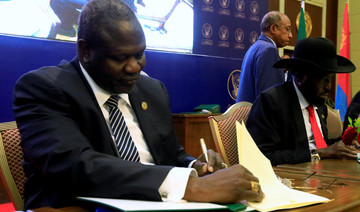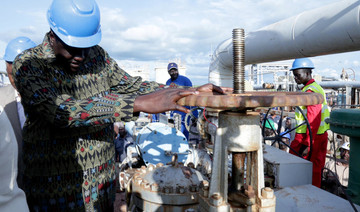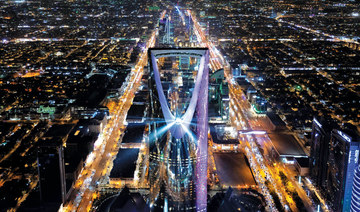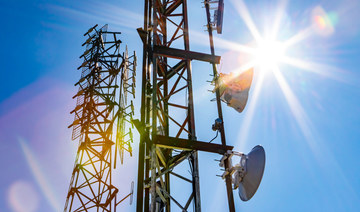JUBA: Emboldened by a new peace deal, civil war-torn South Sudan said that it will resume oil production in a key region next month to make up for more than $4 billion of revenue lost during years of fighting.
South Sudan, with Africa’s third-largest oil reserves, will renew drilling in northern Unity State for the first time since the fields were destroyed when the conflict began in late 2013, oil ministry officials told The Associated Press.
The goal is to have all five locations there operational by the end of the year and working alongside the oil fields in Upper Nile State, which operated throughout the civil war.
South Sudan’s economy is almost entirely dependent on exports of oil from its 3.5 billion barrels of reserves. Most of the oil rigs were shut down or destroyed by the civil war. The fighting that killed tens of thousands of people has also devastated the economy and sent prices for everyday items soaring.
Oil was central to South Sudan’s potential when it won independence from Sudan in 2011. In the seven years before the civil war began, oil brought in more than $13 billion in revenue, according to the finance ministry.
South Sudan’s government is optimistic about the resumed production, even attributing the peace deal signed early this month to the country’s reserves.
“Without oil there probably wouldn’t be peace right now,” Awow Daniel Chuang, the oil ministry’s director-general, told AP.
However, that peace is fragile. This week South Sudan’s opposition briefly refused to sign the final peace agreement because of outstanding issues. It accused the government of using oil revenues to buy weapons, ammunition and politicians to undermine the peace, said opposition spokesman Mabior Garang de Mabior.
The goal of resuming oil production in Unity State is to help increase South Sudan’s total output of 130,000 barrels per day to almost 300,000, which could bring in about $5 billion over the next few years, Chuang said. Another part of the goal is increasing Upper Nile State’s output to 200,000 barrels per day.
The new peace deal was brokered by Sudan, which has a vested interest in its neighbor’s oil production. As part of the initial agreement when South Sudan gained independence, Sudan was entitled to more than $3 billion of oil revenue, $1.2 billion of which is still owed, South Sudan’s oil ministry said.
The government also hopes to attract investors during the second local Africa Oil & Power conference in November in the capital, Juba.
While industry experts say that the prospects look promising, some say efforts will be futile if the fighting resumes.
“There is enormous pressure to ensure that the peace deal holds and that Sudan and other neighbors play a big role in enforcing and ensuring peace,” said NJ Ayuk, founder and CEO of Centurion Law Group and chair of the African Energy Chamber of commerce.
Currently there’s great interest from Asian, African and Eastern European countries looking to “defy the odds” and operate in a difficult environment as there’s still a lot more oil to be found in South Sudan, he said.
At least one oil group said that it feels confident the situation in northern Unity State is secure enough to resume production.
“We’ve been to the field many times and have done assessments and there have been no incidents. Peace has come,” said Angelo Chol Dongway, vice president for the Greater Pioneer Operating Company, a consortium of four oil companies licensed to operate there. They are the China National Petroleum Corporation, India-based Oil and Natural Gas Corporation, the Malaysia-based Petronas and South Sudan’s state-owned NilePet.
Other international investors aren’t as convinced.
“It sounds hopeful but internal politics, legal and economic stability have to be demonstrated,” said an oil industry consultant for a large company who spoke on condition of anonymity because the consultant wasn’t authorized to speak on the record.
South Sudan’s oil sector has faced scrutiny by the international community for its alleged lack of transparency and use of state oil revenue to fuel the civil war.
Earlier this year the US government placed sanctions on 15 of South Sudan’s oil-related entities, including NilePet and the oil ministry, in an attempt to stem the flow of “corrupt official actors” using revenue to buy weapons and fund militias.
Some advocacy groups worry that the increased production could bring more corruption.
“Without stringent processes of accountability, well-connected politicians and their commercial collaborators are likely to cart this money away,” said Brian Adeba, deputy director of policy at the Enough Project, a Washington-based advocacy group.
“This corruption in turn becomes an incentive for more violence against the state as aggrieved groups seek redress and a seat at the looting trough through the barrel of the gun.”
Oil-rich South Sudan to resume production in war-hit region
Oil-rich South Sudan to resume production in war-hit region
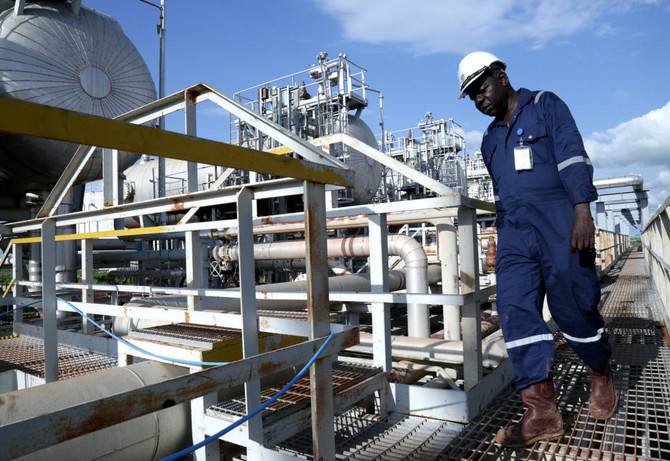
Europe to launch chamber of commerce in Riyadh
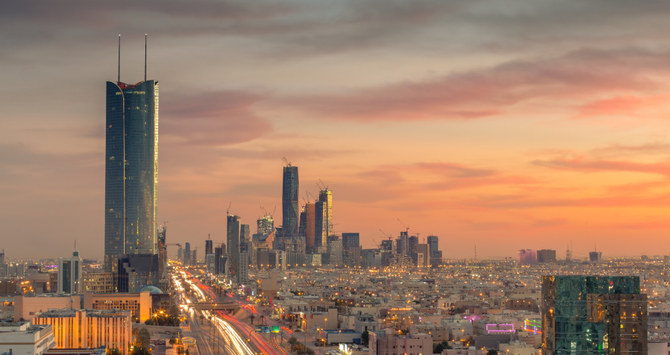
RIYADH: The first European Chamber of Commerce in the Gulf region will open next week in Riyadh, the EU’s special representative for the Gulf region has told Arab News.
Luigi Di Maio said the new body would bring Saudi and European companies together to enhance trade and cooperation.
“We’ve worked very hard with the Ministry of Investment, your Ministry of Trade. The EU delegation in Riyadh did a great job. And now we are going to inaugurate this chamber,” Di Maio said.
“That is in order to bring closer our companies, Saudi companies and European companies, to take on both sides the new opportunities of the Vision 2030 program … of our new European Green Deal, Next Generation EU, and others.”
Saudi Arabia’s Vision 2030 reform program had transformed the global business community’s view of the Kingdom, Di Maio said. “The ambitions, especially economic ambitions, of Saudi Arabia are totally changing perceptions of the Kingdom around the world,” he said. “There is a business community that is more and more interested in these ambitions, in this vision, and in a new generation of dreamers in this country.”
There was a growing recognition of the Kingdom’s diplomatic and economic influence, Di Maio said. “Saudi Arabia is becoming more and more the point of reference because now it is implementing its vision for the region that is not just an economic ambition, but is a new policy and new initiatives in order to de-escalate, to make the region in peace and wind down on tensions like the tension that we are experiencing now.
“The partnership and the strategic partnership between the EU and GCC countries, in particular with countries like Saudi Arabia, is vital.”
Red Sea Global offers more than 50 leisure activities: top official
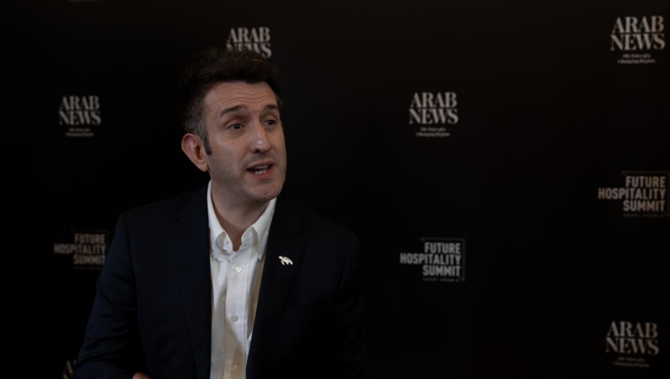
RIYADH: Contrary to popular conception, sporting activities provided in the Red Sea and AMAALA are not just confined to water, but these destinations offer exciting leisure choices on land as well, said a top official.
Speaking to Arab News at the Future Hospitality Summit, Oliver Wood, senior director of Destination Development at Red Sea Global, said the destination currently offers more than 50 activities for visitors.
Wood said that RSG created three business entities last year — Galaxea, WAMA, and Akun.
Galaxea provides diving experiences to visitors, while WAMA and Akun offer water activities and adventure sports respectively.
“Galaxea is a coral that’s endemic to the Red Sea. It looks like, a kind of submarine galaxy that sits below a constellation and is beautiful. Then we created WAMA which is a way for water. And then we created Akun, which to us, is obviously ‘to be’ in the moment, start when you stand, breathe, leave everything behind,” said Wood.
He added: “So, all three of these businesses work together to do something that will reduce the misconceived fact that we are just water. We are land as well. In fact, similar to our surroundings, our land was created by water. Fifty million years ago, the sea was 120 km inland and 200 m higher. So we’re finding dinosaur bones. We’ve got petroglyphs, we’ve got ancient trade routes.”
According to Wood, some of the land activities offered in the Red Sea and AMAALA destinations include biking and hiking, with RSG recently delivering electric fat bikes for visitors.
“So for us, it’s about taking you out hiking. It’s taking you biking, supercool Akun electric fat bikes that we just got delivered. So, you can go sand, and gravel wherever you want. It’s about climbing to the top of our mountains,” he added.
The RSG executive also lauded the efforts of the Saudi Sailing Federation and the Saudi Water Sports and Diving Federation in promoting water sports in the Kingdom.
“The Saudi Sailing Federation, Saudi Water Sports and Diving Federation, they’re bringing this sport to the forefront. So, together we’ve created this blueprint so that you have more Saudis in the water, more tourists that are going in the water,” he noted.
Wood said that the availability of e-foils is one of the major attractions in the destination.
“E-foils is a surfboard that’s electrified, has this fin in the middle that pushes you above the water, so you glide through it without any friction. That is one of the most popular things we do. It is really good fun,” said Wood.
He added: “You can kayak through mangroves. And, then below the water is incredible. It’s one of the most well-preserved reefs in the world, and we’re very lucky to be working with KAUST on the scientific side.”
According to Wood, Galaxea is not just a diving brand, but it will allow visitors to understand the beauty and value of nature.
“There are lots of rare and endangered species beneath the water and it’s just incredible. It is a beautiful experience that allows you to reset your mind and just have a beautiful time in the Red Sea,” said the RSG official.
He revealed that RSG brand Corallium, which is a marine life institute, will help travelers understand more about protecting, preserving, and supporting water ecosystems.
Wood added that Corallium would also help divers communicate with experts in real-time, as they enjoy the beauty of the marine world.
According to the RSG website, Corallium can host 650 people at one time, and guests will be able to walk underwater, snorkel with rare species, participate in lab tours as well as dive into the depths of the Red Sea in a submarine.
“So as a diver, so you go snorkeling, you’re kind of shut off from it and experiencing it. Then you can speak to somebody afterward and understand.
“We try and extend that a bit further. you actually get to go out in these experiences and dive with a full face mask, communicating in real-time, under the water with our team,” he noted.
Wood also revealed that RSG has plans to create a scuba spa, where people can enjoy the silence in water.
Talking about the multiple options available for travelers in the Red Sea, he said: “You can be in the middle of desert dunes, you can be out in granite mountains. You can even go down to volcanoes. We have incredible volcanic lava fields that sit close to us. And then you can be in the water. You can be in front of 600-year-old pillars of coral reef. You can go through caves into the water.”
Wood also hinted that RSG is working toward offering Red Sea and AMAALA destinations to people who fall both in the luxury class and the middle range.
“We’re trying to show generosity in the value that we offer everybody there. We’ve tried to not only benchmark globally but try and push it right down so it is accessible to everybody and so that everybody can come and really enjoy it,” said Wood.
He added: “For me, it’s about building things around that enable people to come and get involved with it. So there are all sorts of things that we’re working on right now that will be revealed and are coming up.”
BlackRock, PIF launch multi-asset investment management platform in Riyadh
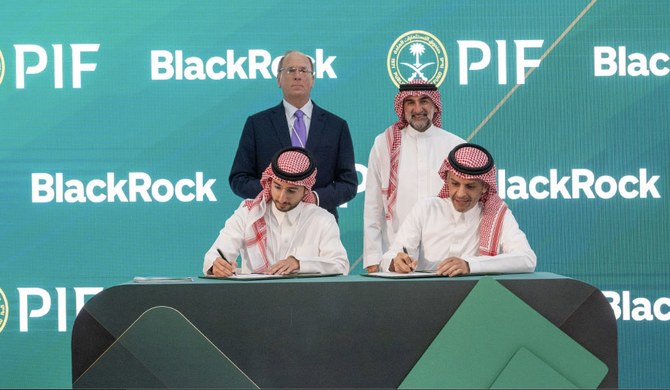
- First-of-its kind partnership aligns with PIF’s initiatives to drive further growth of the Saudi capital markets ecosystem, sector
- It will be anchored by an initial investment mandate of up to $5bn from PIF
RIYADH: BlackRock Saudi Arabia and the Public Investment Fund signed a memorandum of understanding on Tuesday which entitles the former to establish a Riyadh-based multi-asset investment platform.
It will be anchored by an initial investment mandate of up to $5 billion from PIF, subject to the achievement of agreed milestones between the parties, said a media statement.
Both parties have expressed the intention to establish BlackRock Riyadh Investment Management, which will encompass investment strategies across a range of asset classes. It is expected to be managed by a Riyadh-based portfolio management team and supported by BlackRock’s global asset management platform.
Larry Fink, BlackRock’s CEO, said: “We are excited to build on the deep partnership we have developed with PIF over many years to launch this first-of-its-kind international investment management platform in Saudi Arabia.
“The continued growth of the Kingdom’s capital markets, and diversification of its financial sector, will contribute to future prosperity for its citizens, the competitiveness of its companies and the resilience of its economy.”
Saudi Arabia has become an increasingly attractive destination for international investment as Vision 2030 comes to life, according to Fink.
He added: “We are pleased to offer investors from around the world the opportunity to take part in this exciting, long-term opportunity.”
Yazeed Al-Humied, PIF’s deputy governor and head of MENA (Middle East and North Africa) Investments, said: “PIF’s relationship with BlackRock is well established and growing. This new landmark agreement represents a step forward in PIF’s work in making the Saudi investment and asset management market more internationally diverse and more dynamic.”
As Saudi Arabia continues to transform its economy, BRIM will seek to support foreign institutional investment into the Kingdom and further enhance the Saudi asset management industry, broadening local capital markets while driving investor diversification across asset classes, facilitating knowledge sharing and the development of Saudi-based asset management talent.
BRIM will be fully integrated with BlackRock’s investment capabilities and operating platform, benefiting from global market expertise.
The non-binding memorandum is subject to satisfying certain necessary conditions, regulatory approvals, and fulfilling specified milestones.
Hospitality brands sign deals to expand in Saudi market
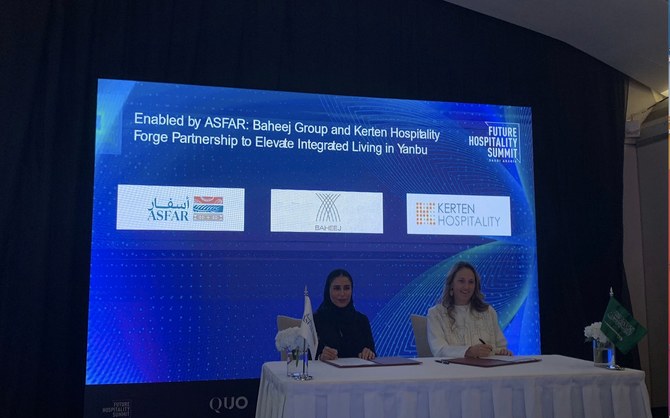
RIYADH: Top hospitality brands signed deals at the Future Hospitality Summit in Riyadh to capitalize on the opportunities available in the Kingdom.
France-based Accor Group said it will strengthen its position in the Kingdom with the addition of more than 25,000 rooms and the launch of a wide variety of brands.
The global hospitality group also recently launched Accor One Living, an initiative offering specialized knowledge in mixed-use and branded residential development.
Ladun Investment Co. signed an agreement with Cheval Collection. The partnership encompasses multiple contracts for the construction and operation of Cheval Ladun Living, which is a hotel apartment tower located on King Fahd Road, near the King Abdullah Financial Center in Riyadh.
The deal represents Cheval Collection’s inaugural project in Saudi Arabia, featuring 130 residential units of varying sizes, from one to three rooms, alongside amenities like a gym, a swimming pool, and a sauna.
The project’s construction is scheduled to begin this year and will be completed in 2027.
Marriott International, Inc. and Al Qimmah Hospitality, a subsidiary of BinDawood Trading, signed an agreement to bring the JW Marriott brand to Jeddah.
Located on the Jeddah Corniche, the hotel is expected to become a prime destination for luxury-seeking travelers who desire a waterfront escape.
“The signing of JW Marriott Hotel Jeddah continues to reflect the strong growth opportunities for our luxury brands across the Kingdom. As part of the country’s Vision 2030 framework, Jeddah continues to build itself as a leisure and business destination,” Chadi Hauch, regional vice president of Marriott International, development of the Middle East, said in a press statement.
On behalf of Al Qimmah Hospitality, Abdul Razzaq BinDawood commented: “We will leverage our expertise and experience in the retail and hospitality sectors to make JW Marriott Hotel Jeddah a successful addition to the city’s landscape.”
Baheej Tourism Development Co., a joint venture between ASFAR, the Saudi tourism investment company owned by the Public Investment Fund, and the Tamimi-AWN Alliance, signed a deal with Kerten Hospitality.
The agreement grants Kerten Hospitality management of Baheej’s hotel in Yanbu under the premium Cloud 7 brand.
Cloud 7 is an innovative hotel and residential lifestyle brand, recognized for its designs, check-in lobbies, healthy food options, and retail boutiques.
“Baheej’s collaboration with Kerten Hospitality underlines our core principle: empowering partners and subsidiaries through our expansive network,” Fahad bin Mushayt, CEO of ASFAR said.
The PIF-owned company also signed agreements with Mantis and KMC to manage the operations of Al Baha Mountain Lodge & Adventure Park.
Cashless payments in Saudi Arabia to rise by 7.6% in 2024
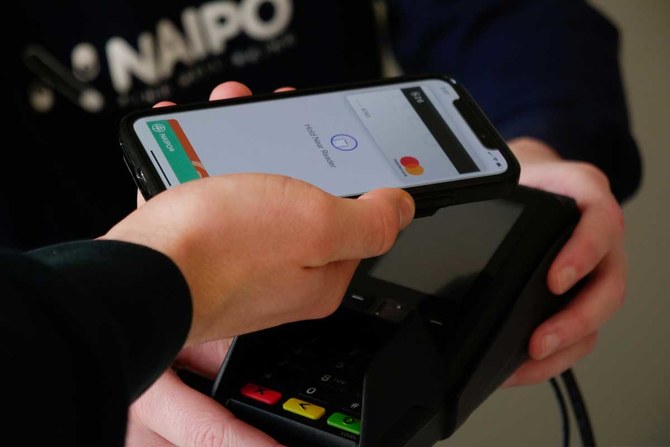
RIYADH: Cashless payments in Saudi Arabia are expected to surge by 7.6 percent in 2024 to SR550 billion ($146.8 billion) as compared to SR511.5 billion the previous year, a report said.
The report issued by GlobalData, a London-based data analytics and consulting company, projected the Saudi card payments market to grow at an annual rate of 6.4 percent between 2024 and 2028 to reach SR705.2 billion.
The uptick comes amid the Saudi government’s push for a cashless society by encouraging consumers to switch to cards for financial transactions.
“While cash has traditionally been a preferred method of payment in Saudi Arabia, its usage is on the decline in line with the rising consumer preference for electronic payments,” said Ravi Sharma, a lead banking and payments analyst at GlobalData.
He added: “The country has a robust digital payment infrastructure, supported by a developing card market and a well-established card acceptance infrastructure.”
Sharma further noted that Saudi Arabia’s government is taking effective steps to enhance the infrastructure in the country by encouraging merchants to adopt at least one electronic payment option apart from cash.
The report, however, added that cash remains an integral part of the Saudi consumer payments landscape, particularly for lower-value transactions, but the usage of hard currency is showing signs of decline.
Promoting digital payments is crucial for Saudi Arabia, as the Kingdom’s Vision 2030 aims to reduce cash transactions and increase the share of electronic payments to 70 percent of all transactions by 2025.
“The (COVID-19) pandemic changed the way Saudi consumers make payments, with an increasing number of consumers preferring contactless payments,” said Sharma.
He added: “Contactless cards have been on the rise in the country with the Saudi Arabian central bank reporting 363.4 million transactions using NFC-enabled mada cards in February 2024 compared to 331.7 million in February 2023.”
In terms of card preference, debit cards dominate the overall card payment space, accounting for 85 percent of the overall card payment value in 2023.
GlobalData pointed out that the government’s financial inclusion initiatives, consumers’ preference for debt-free payments, and prudent consumer spending have resulted in the domination of debit cards in the Kingdom.
“Saudi consumers are gradually embracing electronic payments, moving away from cash, supported by government push, improvements in payment infrastructure, growing consumer awareness, and rising adoption of newer technology like contactless,” added Sharma.
In April, data released by the Saudi Central Bank revealed that payments made through point-of-sale terminals in the Kingdom experienced a significant 20 percent annual increase in February, totaling SR53.72 billion.
The largest portion of POS spending in February was allocated to beverages and food, comprising 15.7 percent or SR8.43 billion.
This was followed by spending on restaurants and cafes, accounting for 15 percent of the total, reaching SR8.02 billion.


